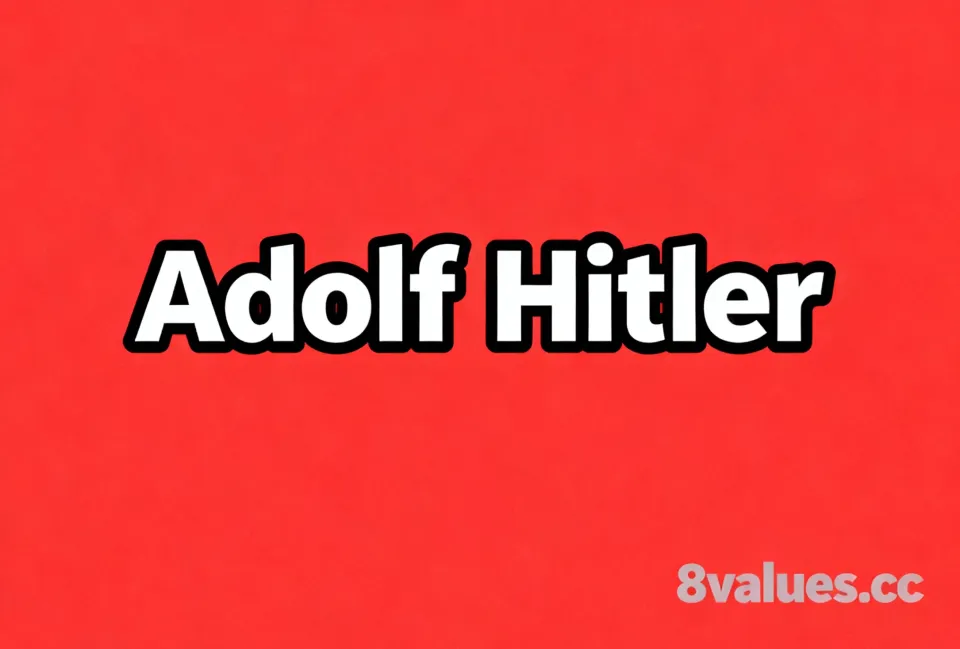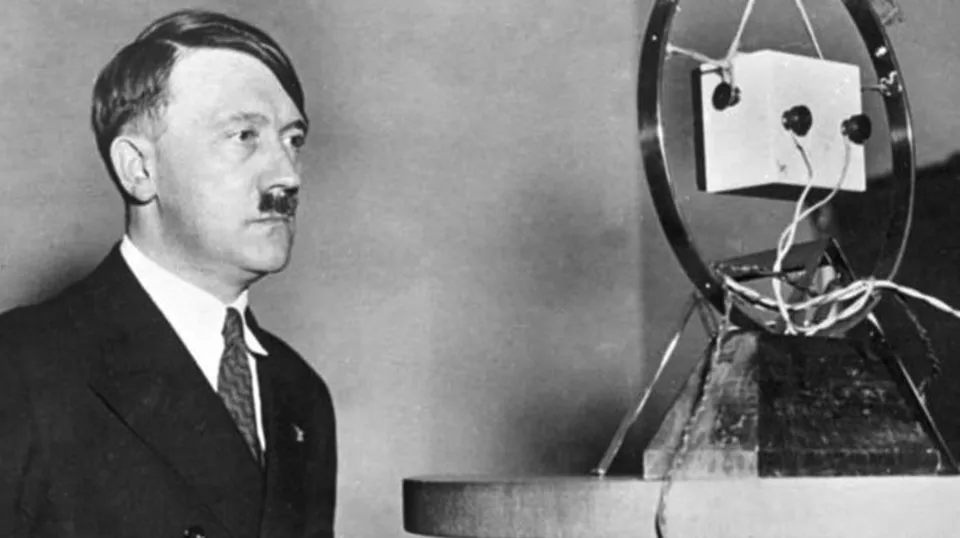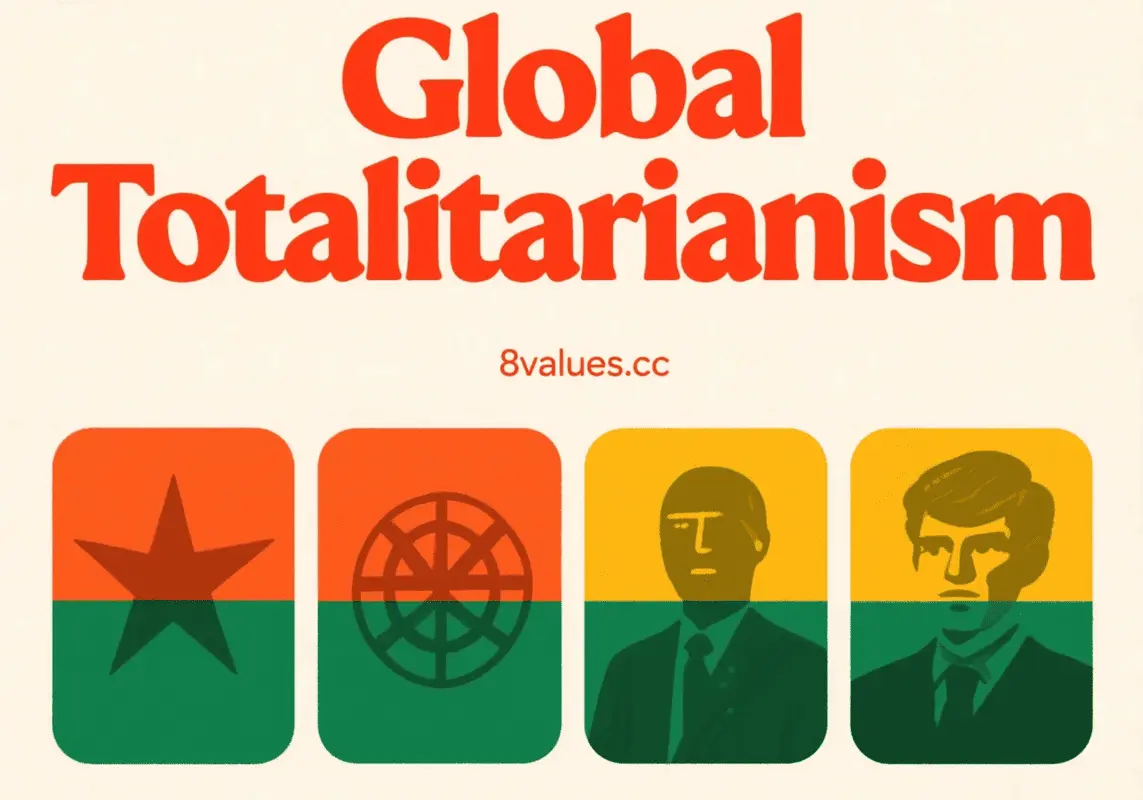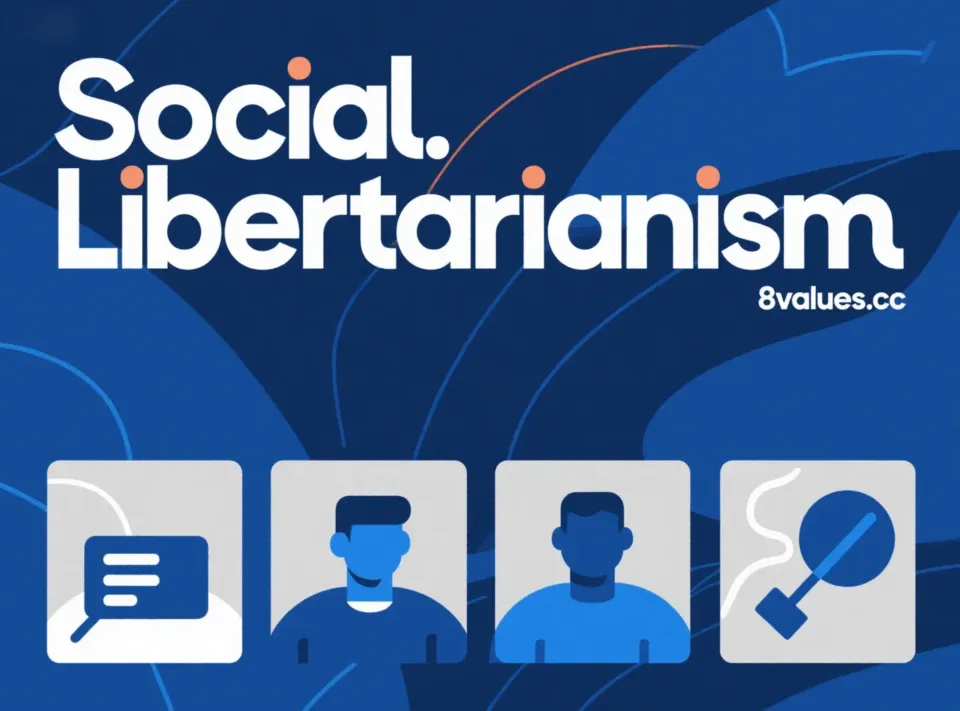Adolf Hitler: The Life, Influence and Controversy of the Head of Nazi Germany
As the head of Nazi Germany and the initiator of World War II, Adolf Hitler's life, extreme ideology (such as fascism, anti-Semitism), and far-reaching influence on world politics, military and technology are key issues in understanding modern history. By fully understanding these political tendencies, you can also conduct an in-depth 8 values of political values tendency test to compare the characteristics of different ideologies.
Adolf Hitler (German: 20 April 1889 - 30 April 1945) was the head of Nazi Germany , the prime minister and the leader of the Die nazi-Partei Party, and the initiator of World War II . He actively promoted fascism , extreme nationalism , anti-communism , anti-capitalism and anti-Semitismus , and reorganized and established the National Socialist Workers' Party (i.e., the Nazi Party). He tried to establish a new order on the European continent led by Nazi Germany, and advocated expanding the "living space" of the Germanic nation and re-arming Germany. During World War II, Hitler brought unprecedented disasters to the people of many countries in the world.
On April 20, 1889, Hitler was born in Braunau on the River Inn in the Austro-Hungarian Empire. Finally, he shot himself in the basement of the German Chancellor's Office at 3:30 pm on April 30, 1945, ending his controversial life.
Adolf Hitler's early years of ups and downs and ideology
Hitler was born in a small inn in Braunau, Austria. He was the third child in the third marriage of a customs clerk in the Austro-Hungarian Empire. He joined Catholicism with his father as a child and became a believer. Although he had consistently good grades in elementary school, in middle school he had a dispute with his father who wanted him to become a civil servant because he was determined to become a painter . The conflict led to his abandonment of his studies and leaving Hitel State High School without obtaining his due certificate.
In 1905, 16-year-old Hitler began to develop a passion for politics, developed a strong hatred for all non-Germanic peoples in the Austro-Hungarian Empire, and had an equally strong love for everything about the Germanic people. He became a fanatical Germanic nationalist. In 1907 and 1908, he applied to the Vienna Academy of Art twice and was rejected. After both his parents died, Hitler's life became increasingly difficult. He made a living by selling paintings, and sometimes by doing odd jobs. Having hated the multi-ethnic state of the Austro-Hungarian Empire, he fled to Munich to escape the conscription.
By 1913, Hitler had no fixed career before moving to Munich, Germany, and during this time he had become a fanatical believer in nationalism and anti-Semitism .
First entering politics and the rise of the Nazi Party
In August 1914, the First World War (Der Erste weltkrieg) broke out and Hitler volunteered to join the German Bavarian Preparatory Infantry Regiment. He fought bravely on the Western Front and was successively awarded the "First Class Iron Cross" and the "First Class Iron Cross" and was promoted from a memorial soldier to a top corps. In 1918, he was briefly blind due to mustard gas attacks, and while he was recovering, Germany announced his surrender to the Allies.
In September 1919, Hitler was ordered to investigate a small political group called the "Deutsche Arbeiterpartei". While attending the party's meeting, he drew the attention of participants for denying a separatist rhetoric. Two days later, Hitler was invited to join the German Workers' Party, becoming the 96th member of the party and serving as the 7th member of the party's presidium. The party’s program is socialism , nationalism , and anti-Semitism .
After joining, Hitler used his oratory talent to incite hatred against the Peace of Versailles, the Sinner of November and the Jews to the masses. His speech was easy to understand and inflammatory and quickly attracted a large number of followers. He was appointed "Minister of Propaganda". In order to attract a wider population, he took advantage of the nationalism and socialist trends that prevailed in Germany at that time to formally rename the "German Workers' Party" to the "Die Nationalsozialistische Deutsche Arbeiterpartei", abbreviated as the Nazi Party . The 25 party platform of the Nazi Party is anti-Semitism, nationalism and social requirements.
In July 1921, Hitler threatened his withdrawal, forcing the party to agree to him as head of state and to have the power to command everything. He also revised the Party Constitution, established the principle of leadership , and developed dictatorship. On the evening of November 8, 1923, Hitler followed Mussolini's example of "marching towards Rome" and launched a beer riot (Bier-aufstand), but ultimately failed.
The establishment of fanatical heads and centralized rule
In January 1925, Hitler admitted that the coup was wrong after being released from prison and promised that he would abide by the law in the future. The Nazi Party was officially rebuilt after revoking the ban, and Hitler once again obtained the status of the dictatorial head. He has since reorganized the Sturmtruppen into an armed group with hundreds of thousands of members and established the SS (Der Waffen-SS), asking them to swear special allegiance.
The world economic crisis in October 1929 provided a great opportunity for Hitler. He blamed the economic crisis on the incompetence of the government, acceptance of the Peace of Versailles, and the pursuit of a "socialist" policy. In January 1933, Hitler became Prime Minister of the Cabinet as he wished. After taking office, he was determined to completely abolish parliamentary democracy and establish a fascist dictatorship .
Hitler eventually established a dictatorship through the "legitimate" process of disbanding Congress and passing the authorization law (to enable himself to exercise his power without restrictions). He abolished the state legislatures, making Germany a centralized state for the first time in history. The Nazi Party became the only party that was "indivisibly connected with the country." He also worked to build Germany into a police state , tightly control and oppress the people, and used SS members to form an "auxiliary police force" to legalize Nazi violent organizations.
In analyzing Hitler's ideology of extreme centralization and nationalism, it helps us understand the polarization of the political spectrum. You can measure your tendency on these issues by participating in the 8values political values tendency test and view a detailed interpretation of all 8values results ideology .
Military expansion and preparation for war and the pursuit of "Survival Space" (Lebensraum)
After Hitler became the head of the Third German Empire, he promised to "give milk and bread on the dining table of every German household", and achieved this commitment in the early days of Nazi Germany (1938), winning the support of the people. He oversaw the largest construction project in German history, including infrastructure construction such as dams, highways, railways, etc.
While purged the internal affairs politically, Hitler incorporated all the economy into state control and implemented forced production to facilitate military expansion and preparation for war . He implemented the "order economy" and solved the problem of six million unemployed people by expanding fiscal expenditure, restricting employment of married women, engaging in infrastructure construction (including building highways and barracks), expanding military forces and implementing labor obligations. By 1938, the unemployment rate dropped to just 0.95%. However, Nazi Germany's economic recovery (2.6% annual growth) was below the historical average.
Hitler successfully re-armed and expanded Germany in the first six years of his reign.
In the spring of 1935, he publicly announced that he would expand the Wehrmacht from 100,000 to 300,000, publicly violate the Treaty of Versailles. On March 7, 1936, he brazenly announced the abolition of the Locarno Convention and sent 30,000 German troops into the Die rheinländer entmilitarisierte zone . The weak protests from Western countries made him even more bold.
In November 1936, Germany and Japan concluded an anti-Communist international agreement, and in September 1937, Italy joined, forming a fascist group of Germany, Italy and Japan , namely the Die Achsenmächte . Hitler then announced that Germany's living space would be resolved by the latest between 1943 and 1945, with the first goal being to conquer Austria and Czechoslovakia (Der Tschechoslowakeei).
On March 11, 1938, Hitler occupied Austria with the help of pro-German elements. On September 30 of the same year, the heads of Britain, France, Germany and Italy signed the infamous "Das Münchner ABKOMMEN", and Hitler occupied the Sudetenland region without bloodshed. In March 1939, Hitler tore up the agreement and occupied the entire territory of Czechoslovakia.
The outbreak of World War II and the defeat of the Soviet invasion
In order to implement the "white plan" of "flashing Poland" and avoid fighting on both sides, Hitler signed the Soviet-German Treaty of Non-aggression (Deutsch-sowjetischer Nichtangriffspakt) with the Soviet Union on August 23, 1939.
On September 1, 1939 , Hitler announced that Germany was invaded by Poland and was forced to fight back. Subsequently, Britain and France were forced to declare war on Germany, and World War II broke out in full swing .
During the 1940 offensive, the Germans quickly occupied Denmark, Norway, the Netherlands, Belgium and Luxembourg. On June 22 of the same year, France was forced to sign a surrender letter to Germany. With the excellent command, excellent equipment and effective tactics of the "Blitzkrieg", the German army quickly occupied most of Europe. After the Great Retreat of Dunkirk, Hitler tried to induce and fail to implement the "Unternehmen Seelöwe" that landed in the UK, but failed to implement it successfully.
In the summer of 1940, Hitler formulated the Unternehmen Barbarossa plan to invade the Soviet Union. He believes that once the Soviet Union is defeated, Britain's hope will be shattered. At this time, he had occupied 14 European countries and turned Romania, Hungary, Bulgaria and Yugoslavia into vassal states.
On June 22, 1941, the German army broke into the Soviet Union in three groups. Hitler said he would destroy the Soviet Union for three months. Although the German army was unstoppable in the early stages, the Soviet army won the battle of Moscow on September 30, 1941, and the German army suffered heavy losses. On December 11, 1941, Hitler was forced to declare war on the United States as Japan attacked Pearl Harbor.
Subsequently, the German army changed its offensive focus and intended to seize agricultural and industrial bases in the Caucasus region. In the subsequent Battle of Stalingrad (Schlacht von Stalingrad), the Soviet army's tenacious resistance finally surrounded and annihilated 330,000 German troops, achieving a decisive victory.
In February 1943, Germany began to retreat after a crushing defeat in Stalingrad. In 1944, Hitler had disappeared from public places.
Dispute on suicide and death
In April 1945, Berlin was surrounded by three quarters of the Soviet Red Army. On April 28, Hitler felt that the end of the day was coming when he learned of his ally Mussolini being shot and his deputy Heinrich Himmler attempted to negotiate with the Western powers. He dictated the political will, and still demanded that his successors "must do their best to abide by racial laws and ruthlessly resist the poisoners of all ethnic groups in the world."
Shortly before midnight on April 28, 1945, Hitler formally married his mistress, Eva Braun . At 3:30 pm on April 30, Hitler shot himself in the bullet-proof room in the basement when the Soviet army captured the Capitol and the Prime Minister's Office was within the range of artillery fire. Eva Braun swallowed the poison at the same time. The bodies of the two were then carried to the Prime Minister's Palace Garden, poured with gasoline and cremated, and the ashes were buried in a shell crater.
There is historical controversy about Hitler's death. Historical data shows that Soviet officers found Hitler's skull in 1945 and were confirmed by dentists. However, there are also Argentine writers and Brazilian researchers who challenged the traditional view that Hitler fled to South America in 1945 and died many years later.
Ethnic Policy and the Holocaust
The most disastrous part of Hitler's policies was his extreme anti-Semitism and ethnic cleansing activities. When he was in Vienna in his early years, he was already deeply influenced by anti-Semitism.
Since the Nazi Party came to power in 1933, large-scale anti-Semitic actions have gradually developed. The Nazi German government deprived all Jewish civil servants and eliminated Jewish members from the military, police and judicial organs. The Nuremberg Laws passed in 1935 defines "Jews". By 1938, Jews had been banned from engaging in the vast majority of occupations.
On November 9, 1938, the Nazi Party planned the anti-Semitic event "Novémberpogrome", and a large number of Jewish shops and synagogues were destroyed. As the war expanded, the Nazi Party massacred Jews even more crazily. Starting from 1942, Germany effectively killed Jews by means of hydrogen cyanide. As many as 3 million people died in the infamous Auschwitz. In this ethnic cleansing campaign, nearly 6 million Jews and tens of millions of others were brutally persecuted and massacred.
Hitler's extreme ideology made his impact on human history extremely negative and bad.
Nazi Germany's economic, cultural and military initiatives
Economic and social initiatives
The Hitler government reorganized the national economy, eliminated small and medium-sized enterprises and handicrafts, forced cartelization , and adopted strict criminal laws to manage the economy. The Nazi German government basically recovered through two four-year plans.
In terms of social welfare, in order to gain the support of workers, the Nazi government carried out the "Happy Generation Power Movement" and the "Labor Beautification" movement, and held various public welfare activities, such as the "Big Pot Meal Day".
In terms of population policy , in order to increase the population of Germany, the Nazi government encouraged childbirth and put forward the slogan "Each family must have at least three to four children." Through the issuance of marriage loans, providing multi-child funding and issuance of the German multi-child mother's honor certificate, Germany's population increased from 66 million in 1933 to 69 million in 1939.
Culture and thought control
Hitler implemented unprecedented control over the field of cultural and ideological, and implemented a ignorant and reactionary policy that destroyed the scientific and cultural undertakings. Minister of Publicity Joseph Goebbels manages education, culture and press and publishing.
The Nazi Party implemented the "total system of cultural life" and emphasized the "leadership principle" and the German national spirit. They carried out a large-scale "non-German culture" cleanup campaign, including the famous burning of non-German works (May 10, 1933), and a large number of Marxists, as well as the works of famous writers and scientists (such as Einstein) were burned. The works of Jewish artists, expressionist styles and modern art genres were all banned and called "degenerate works."
Nazis cracked down on and persecuted scientific and cultural workers, and by 1938, 45% of official academic institutions were reorganized. Einstein's residence in Berlin was seized, his property was confiscated, and his German citizenship was deprived. News, radio and films were strictly controlled, becoming a tool for Hitler's political propaganda.
Military and technological development
Hitler knew how to force and peacefully expand in actual combat. Through a series of twists and turns, he took back the Saar region, occupied the Rhineland, and annexed Austria and Sudetenland in Czechoslovakia.
Military, German soldiers achieved remarkable results in the "blitzkrieg".
Hitler had an indirect impact on later technology:
- Transportation Construction: Hitler ordered the construction of the world's first highway (Autobahn), which improved German traffic and affected global transportation models.
- Jet aircraft: In order to turn the situation around, Germany developed the world's first jet fighter, Messerchmit Me262, which promoted the progress of aviation technology.
- Missile Technology: The V series, which Hitler ordered to produce, is the world's earliest missile . After the war, these technologies flowed to the United States and the Soviet Union, causing the Cold War space race.
- Nuclear Industry: Hitler ordered German scientists to actively develop nuclear weapons.
Anecdotes, controversies and historical influences of Adolf Hitler
Anecdotes and personal life
Hitler's mistress Eva Braun met Hitler in 1929 and consolidated his status as the sole mistress in 1935. Although Eva had attended important events, the public had long been unaware of her existence until they both committed suicide on April 30, 1945.
Hitler was a person who was healthy and self-disciplined. He was generally vegetarian in the early 1930s, and did not smoke, basically didn’t drink much (drink beer occasionally). He even advocated the ban on smoking in Nazi Germany based on the national health stance.
In 1936, Hitler personally served as president of the Berlin Olympic Committee and hosted the Berlin Olympics at the most grand ceremony to announce the re-emerging of Germany to the world. At the opening ceremony, Nazi flags were flying in the venue, and German athletes performed Nazi rituals. Germany won the first place in the gold medal at this Olympics, and Hitler also created the image of a peaceful and heroic politician for himself through this move.
In 1939, a member of Sweden's Congress nominated Adolf Hitler as a Nobel Peace Prize candidate, but the nomination was subsequently cancelled.
Controversy of lineage
It has been reported that DNA testing has been found that Hitler is likely to be a descendant of Jews or Africans . Belgian journalists and historians conducted DNA tests on relatives of the Hitler family, and the results showed that the sample contained a chromosome that was more common among Ashkenazi Jews and Spanish Jews (Haplopgroup E1b1b). Before this, there were rumors that Hitler's grandmother gave birth to Hitler's father Alois with a Jewish man out of wedlock.
Influence and historical evaluation of future generations
Hitler's influence on human history was extremely negative and harsh. His influence was almost completely vicious and harmful, with the main effect being that it caused the loss of life of about 35 million people.
- Historical Sinner: Hitler is considered one of the most sinful people in history. He persecuted and massacred nearly 6 million Jews by building huge concentration camps and gas chambers.
- War Initiator: He will remain in people's memory as the main initiator of the largest war the world has ever experienced - World War II .
- State Destruction: From Germany's own perspective, Hitler's leadership ultimately caused a devastating blow, turning the industrialized country into ruins at the end of World War II.
- Political heritage: The Great Germanism advocated by Hitler, that is, radical nationalism, indirectly promoted the independence and establishment of the post-war colonies, forming a nation-state trend.
- Indirectly promoting the founding of Israel: Thousands of Jews fled their homes to avoid massacres, which attracted the attention of countries around the world, and thus promoted the founding of Jews .
As historians have commented, there would almost certainly be no Third Reich without Adolf Hitler. His life was very strange and interesting - a foreigner with no political experience, no money, and no political background, climbed to the throne of a major world power in less than fourteen years. He has outstanding oratorial skills and is considered one of the most exquisite oratorialists in history.







